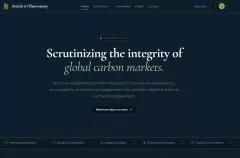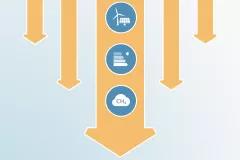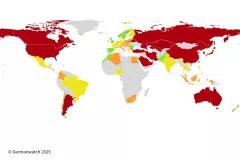The original version of this op-ed was published on Reuters.
15 October – Since the Paris Agreement was adopted in 2015, corporate climate commitments have surged. Net-zero pledges are now common among the world’s largest companies, with major players across industries announcing targets to cut greenhouse gas emissions.
Yet halfway through what the United Nations calls the critical decade for climate action, progress on the ground remains limited. Many companies still lack credible plans to achieve their emissions- reduction targets, and evidence of structural changes in business models is scarce.
This points to the need for a rethink of the corporate climate accountability system. With key corporate accountability standards now being revised, there is a rare opportunity to reshape the system so that it incentivises near-term, credible transitions in corporate operations and business models.
The problem lies in how existing standards define and measure corporate climate action. By focusing on headline emissions-reduction targets, they have fallen short of driving the sector-specific transitions needed for deep emissions cuts.
Targets for 2030 and beyond, long regarded as the centrepiece of corporate climate action, are proving increasingly inadequate as guides to corporate strategy without clear implementation plans. Paradoxically, the real meaning of these 2030 targets has, in many cases, grown less clear as 2030 draws nearer.
Corporate actors have been successfully mobilised to develop climate strategies in recent years, with a focus on setting emissions reduction targets and disclosing annual emissions. As of 2025, around 60% of all Forbes 2000 companies have net-zero pledges, and more than 8,500 companies have their targets validated by the Science Based Targets initiative (SBTi).
However, these targets have yet to translate into meaningful shifts in companies’ operations and business models so that they align with global efforts to limit global warming to within 1.5 degrees Celsius. Few automakers are decisively moving away from internal combustion engines at the speed and scale required. Most agrifood companies lag in shifting to more sustainable business models, such as plant-based proteins. In many sectors, emissions continue to rise where credible near-term transition plans remain weak or absent.
According to the recently published Corporate Climate Responsibility Monitor by NewClimate Institute and Carbon Market Watch, none of the 20 multinational companies assessed had credibly committed to transition their core business models in line with a 1.5C-compatiable pathway, despite many having targets validated by the SBTi or similar accountability initiatives.
This reveals two flaws in the current corporate accountability system.
First, the system currently rewards ambition over action, with weak scrutiny and limited transparency on whether companies deliver on their voluntary commitments. Companies are recognised for setting ambitious-sounding targets, even though those targets are often riddled with loopholes and rely on questionable accounting practices.
This is underscored by a study published in Nature Climate Change in January, which analysed more than 1,000 corporate emissions-reduction targets that ended in 2020. It found that of the 400 companies that missed reaching their 2020 targets, or abandoned them altogether, only three faced intensified media scrutiny.
One reason for this is that companies are currently not required by accountability initiatives or regulation to disclose any detailed plans for how they will meet these targets through specific actions when announcing them. This makes it difficult for journalists, analysts, NGOs and investors to understand the real meaning of the targets, track implementation over time and hold companies accountable in court.
Second, the system fails to distinguish frontrunners from laggards. Ultra-fast fashion company Shein, for example, received SBTi validations for its 2030 and 2050 targets in May, placing it in the same category as fashion companies like H&M Group, despite substantial differences in the integrity of their climate strategies.
H&M Group has substantiated its target to reduce GHG emissions by 56% by 2030 with a parallel commitment to achieve 100% renewable electricity procurement across its entire supply chain. This year, it became the first major fashion brand to publish detailed information on its supply chain energy use.
Shein, meanwhile, has only committed to 100% renewable energy in its own operations, not its value chain, which accounts for 95% of its emissions. Its 2030 target even allows the company to more than double its emissions by 2030, compared to 2021 levels.
This calls into question whether current accountability standards are rigorous or relevant enough to reward genuine good practice.
Still, there are signs of progress. A small but growing number of companies have begun to substantiate their emissions targets with “transition-specific alignment targets” – metrics that directly track companies’ progress on critical decarbonisation milestones within their sectors.
Beyond H&M Group, early, albeit still scattered, examples include Stellantis and GM setting 100% electric vehicle sales targets for key markets; Google and Microsoft pursuing 24/7 carbon-free energy for their data centres; and Danone targeting methane emissions reductions in fresh milk production while expanding its plant-based product range.
While these actions are not yet sufficient to fully align with a 1.5C pathway, they offer valuable blueprints others can follow. Systematically acknowledging and incentivising such good practice can help investors, regulators, courts and civil society distinguish genuine climate leadership from greenwashing and press more effectively for meaningful transitions.
The year ahead presents a critical window. Several major corporate climate standards are under revision, including SBTi’s Corporate Net-Zero Standard and the Greenhouse Gas Protocol, alongside the development of the International Organization for Standardization (ISO) Net-Zero Standard. Together, these standards will establish the building blocks that steer and incentivise corporate climate action for the rest of the decade and beyond.
By focusing on key sectoral transitions, accountability standards can provide clearer guidance and stronger incentives for businesses to transform their operations.
Using sector-specific metrics, they can require companies to set credible transition-specific alignment targets and to track progress in a transparent manner, alongside emission reduction targets. This approach offers a more effective route for corporate climate strategies to deliver the scale of change needed to meet global climate goals.
Regulatory pushback makes the role of these accountability standards even more important. In the European Union, for example, the Commission’s Omnibus package includes proposals that could weaken sustainability reporting rules, despite opposition from many investors and companies. Such rollbacks underscore the need for credible accountability standards to keep corporate climate action on track.
Now is the time to strengthen the corporate climate accountability system. The stakes are too high to miss this opportunity.
The views expressed in this article are those of the authors and do not necessarily reflect the views or positions of NewClimate Institute.






